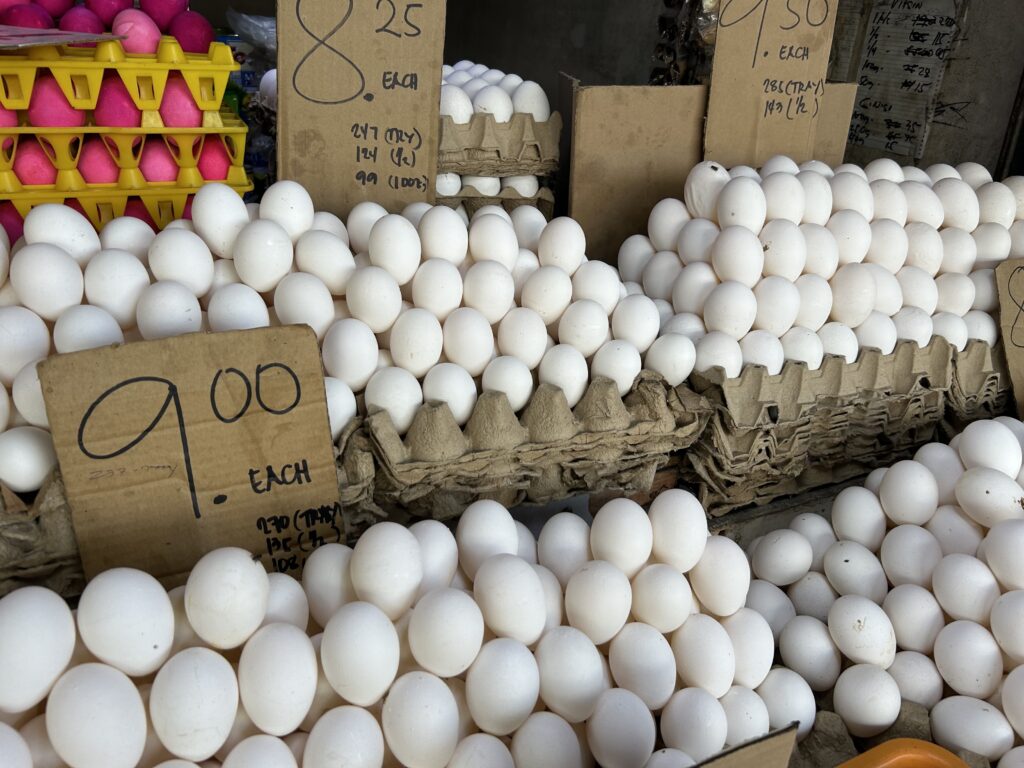Egg shortage: Cebu City on alert amid supply chain disruptions

Fresh eggs are displayed at the Carbon Public Market for marketers, who want to purchase fresh eggs. | Nina Mae Oliverio
CEBU CITY, Philippines — Cebu’s egg supply chain may take a major hit in the coming months as the Department of Agriculture (DA) warns of a looming egg shortage by April due to dwindling poultry production and global supply disruptions.
Erwin Goc-ong, president of the Carbon Market Vendors Development Cooperative (CEMVEDCO), said that while Cebu is a key food security hub for the Visayas and Mindanao, it remains vulnerable to external market shifts due to its reliance on imported poultry.
“A large portion of our egg supply is imported. If global suppliers are affected, we will be, too. The issue is not just our local production but the overall world supply,” Goc-ong said in an interview with CDN Digital on Friday, February 14.
Goc-ong noted that Cebu serves as both a distribution center and a dumping ground for poultry products from other regions. Although egg supplies in February remain stable, he warned that the impact of international disruptions, particularly due to avian influenza outbreaks abroad, could strain local markets resulting in an egg shortage.
READ:
‘There might be a shortage of eggs by April,’ warns DA
Agri chief urges steps to avert possible egg shortage in April
Facing egg shortage, Americans bring chickens home to roost
Agri chief urges steps to avert egg shortage
Egg supply at risk
The DA previously reported that a mass culling of egg-laying hens last year, driven by an oversupply and plummeting farm-gate prices, has led to a sharp decline in local production.
Agriculture Secretary Francisco Tiu Laurel Jr. said the Philippines could experience a nationwide egg shortage within two months if no immediate interventions are made.
“There was an oversupply of eggs last year, which caused farm-gate prices to drop by P4 per piece. Many farmers incurred losses and had to cull their hens to recover,” Laurel said in a statement.
This reduction in poultry stock has now placed future supply at risk, with domestic producers scrambling to replenish their flocks amid surging demand.
The Philippine Egg Board Association, however, remains cautiously optimistic but acknowledges that bird flu outbreaks abroad pose an additional threat.
“We don’t see an immediate crisis, but anything can happen. There are many bird flu cases in other countries, and we hope it doesn’t reach the Philippines,” said Gregorio San Diego, the association’s chairman emeritus.
Cebu officials to address issue
Cebu City Councilor Jun Alcover, chairman of the Committee on Agriculture, told CDN Digital that while they are aware of the potential egg shortage, the council has not yet formally discussed the matter.
“Wala pa mi ka-meeting ana pero siguro next week mag-meet mi aron maka-preparar ta ana,” Alcover said.
He assured that the committee will address the issue in the coming weeks to prepare for any possible impact on Cebu’s food supply and local businesses.
Impact on Cebu’s markets
If the shortage worsens, Cebu’s markets and food industry could face rising prices and supply constraints. Eggs are a staple in households and a crucial ingredient for bakeries, restaurants, and food processors. Vendors at Carbon Market are closely monitoring price fluctuations as concerns grow over potential supply gaps.
Goc-ong noted that local egg production alone cannot meet Cebu’s growing demand. If global supply chains falter, Cebuano consumers could experience price hikes and rationing similar to those reported in the United States, where supermarket shelves have been emptied due to bird flu-related egg shortage.
The DA is now fast-tracking measures to avert the crisis, including the importation of egg-laying chickens and the approval of avian influenza vaccines by the Food and Drug Administration.
The agency also confirmed that a P300-million budget has been requested for vaccine testing, with potential mass inoculation efforts beginning as early as March.
Laurel has also called on financial institutions, such as the Land Bank of the Philippines and the Development Bank of the Philippines, to provide funding assistance for poultry farmers to repopulate their flocks and prevent a prolonged egg shortage.
For now, Cebu remains free of highly pathogenic avian influenza, according to the latest report from the Bureau of Animal Industry.
However, local authorities and industry stakeholders remain vigilant as supply constraints threaten to disrupt the province’s food security.
Disclaimer: The comments uploaded on this site do not necessarily represent or reflect the views of management and owner of Cebudailynews. We reserve the right to exclude comments that we deem to be inconsistent with our editorial standards.
